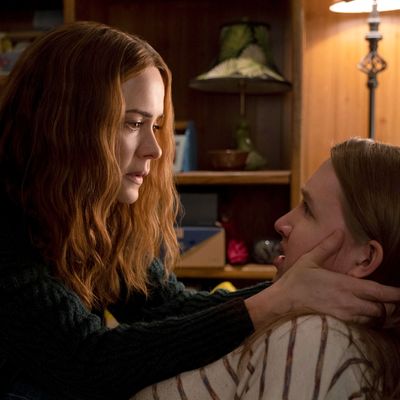
Sarah Paulson has the oval face of a marble Madonna and the fragile affect of someone whose outward show of serenity could at any moment collapse into teary hysteria or explode into rage. In a lot of her roles, she wears femininity as though it were a mask that’s always in danger of slipping and exposing more unruly, indelicate realities underneath. There’s a knowing quality to this approach, a self-awareness that lends itself well to camp, which is one of the reasons Paulson has been such a central presence in the Ryan Murphy Televisual Universe. In September, she starred in Ratched, the most recent byproduct of Murphy’s deal with Netflix, and a show with a premise better suited to a comedy sketch about the creatively bankrupt state of the prestige drama than a two-season order. But while giving an origin story to Nurse Ratched, the psych-ward tyrant in One Flew Over the Cuckoo’s Nest, was both unasked for and an odd misunderstanding of the source material, the role, at least, fit Paulson like a latex medical glove. It was another opportunity to show how adept she is with characters who weaponize buttoned-down white womanhood and the expectations of propriety that accompany it — in this case, doling out violence with a smirk and an insistence that it’s for the recipient’s own good.
She’s adept enough, actually, to play the part of the malevolent angel of mercy twice in one year. In Run, the new film from Searching director Aneesh Chaganty, Paulson has again been cast as a caregiver whose displays of self-sacrificing assistance conceal some truly alarming shit. She’s Diane Sherman, a single mother whose life revolves around her daughter Chloe (newcomer Kiera Allen), a teen living with a slew of health issues — among them asthma, diabetes, partial paralysis — that are implied to be linked to a premature birth. The film walks us through Chloe’s morning routine of creams, pills, inhalers, blood-sugar-level tests, and leg stretches before showing her spending her days homeschooling and waiting for the mail, anxious for acceptance letters from colleges. It’s an isolated life, but the script, which Chaganty wrote with Sev Ohanian, is careful in laying out why Chloe doesn’t see it that way. Diane is the one who drives them into town, doesn’t let Chloe have a cell phone, and keeps the internet-enabled computer in the living room. But she’s doting, and if the comfortable two-story home in which the pair live is actually prison, it’s one whose bars Chloe has yet to bump up against.
And then Chloe discovers that the prescription bottle for one of her regular medications is not actually in her name, a small disruption that leads to the upending of her entire universe. It doesn’t take long for Run to swerve into being a thriller, one in which Chloe’s forced to question everything she’s taken for granted, including whether she’s really as sick as she’s been told and whether Diane has her best interests at heart. The film’s set pieces are scaled to its heroine’s minimal world and have varying degrees of success creating suspense from sequences of sneaking time on the landline and trying to escape a locked bedroom by crawling across the roof. In a rare, welcome bit of casting, Allen is, like the character she’s playing, a wheelchair-user, and the film is unfussy in its portrayal of Chloe’s disabilities and blessedly free from the ickiness that can come from watching an actor approach a disability like something that just makes a role riper. Allen acquits herself solidly, though it would have been nice if Chloe had been given traits beyond “plucky determination” and “liking STEM.” Run isn’t always a clever film, but it is a film in which the characters are clever, and it seems determined to avoid the kind of moments that leave you yelling at the screen in frustration about how terrible someone’s choices are. If it ultimately falls a bit flat, it might be because it’s all a little too sensible.
But then along comes Paulson, with a performance that goes from a barely perceptible simmer to an overflowing boil. Her Diane is a woman who speaks soothingly at support groups and puts a lot of time into her garden and who’s on fire on the inside the whole time about the prospect of not having someone totally dependent on her. The character’s ready with all sorts of reasonable explanations for Chloe’s growing questions, and when those fail, she wraps martyrdom around herself like chain mail, apologizing to the local pharmacist about how Chloe’s new medication has her acting out and tearily urging a would-be savior to “believe a mother when she tells you that her child is sick.” What’s frightening about Diane are not the lengths to which she goes, but how sincerely felt her deeply warped expression of love is — to the point where its recipient doesn’t actually matter, because the act of care is all that counts. Whenever Paulson is on screen, she gives Run a much-needed jolt of vitality as this Munchausen’s-by-proxy monster in catalog knitwear. Her character’s devotion is as terrible as it is unshakeable, but what makes the turn so enjoyable is that it’s grounded in something recognizable — a soul-deep dread of being abandoned, hidden under a nurturer’s smile.
More Movie Reviews
- Dune: Part Two Is Zendaya’s Movie
- Drive-Away Dolls Is Just Fizzy Enough
- Pedro Almodóvar’s Queer Cowboy Short Is Too Sumptuous for Its Own Good





